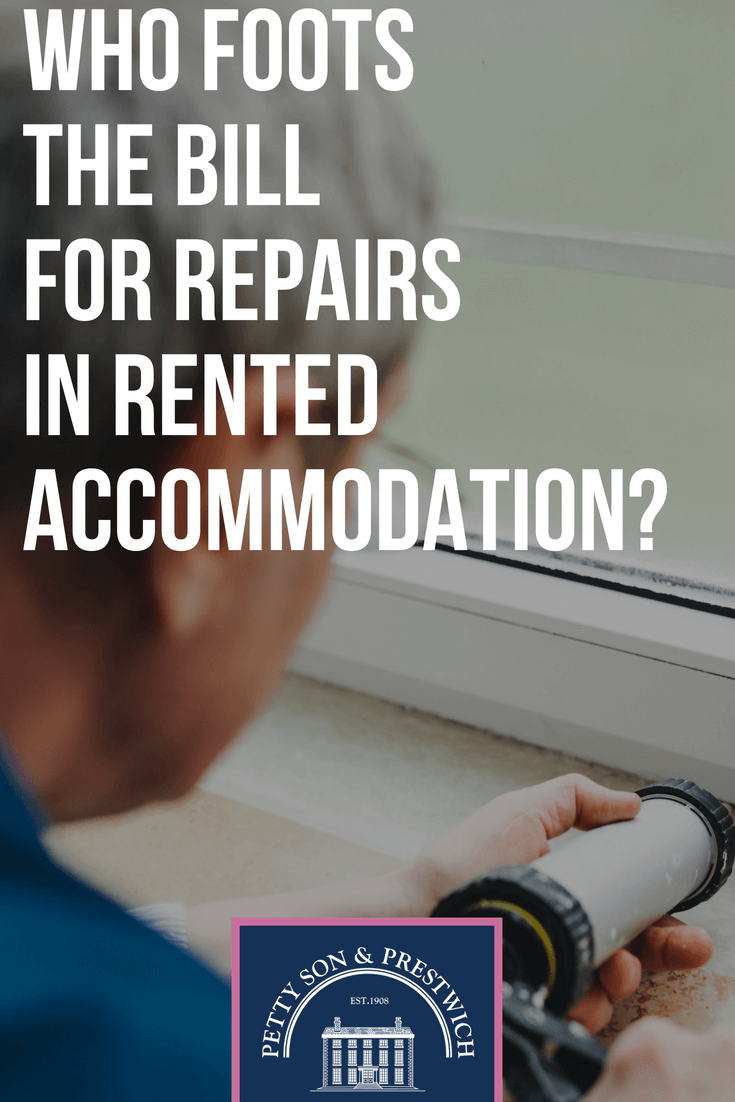A question regularly asked by those looking to move into rented accommodation is, ‘Who has to pay for repairs and maintenance? Is it me or the landlord?’ It’s a valid enquiry, and one that we thought would be worth addressing here on our blog.
What the law says
Regardless of whether your landlord is the local council, a housing association or a private individual or company, they will be responsible for most of the repairs. This includes white goods such as washing machines and fridges that were in the property when you moved in, but does not extend to any appliances that you own.
Landlords are obliged to make repairs and maintain the property to a liveable standard under the Housing Health and Safety Regulations System (HHSRS), The Environmental Protection Act of 1990 and the Landlord and Tenant Act of 1985.
The contract you sign (your letting agreement) before moving in will generally ask you to perform minor household maintenance and repairs while you are a tenant. Your responsibilities will usually include:
- Keeping the home clean and free from pests
- Ensuring that the property is not damaged, by either yourself or your guests
- Heating the home correctly and keeping ventilation areas and flues free from blockages
- Ventilating the property properly to avoid condensation build-up and damp
- Maintaining items such as smoke alarms (replacing batteries when needed, for example)
- Fixing internal fittings, such as bathroom cabinets
- Renewing bath sealant when necessary
- Making repairs to any internal doors that have been damaged
It’s worth bearing in mind that you will likely be held responsible and have to pay for any damage done to the property during your tenancy, regardless of whether it was accidental or otherwise. Failing to keep the property in a good state of repair while you are resident there could result in a deduction from your deposit. That being said, fair wear and tear should not be charged for.
Any major repair work will be the responsibility of the landlord. This will include the following:
- Structural work and any problems associated with the exterior of the property. This includes stairs and their bannisters, external windows and doors, walls, and the roof.
- Electrical wiring
- Hot water and heating
- All sanitary fittings, such as toilets, baths, sinks etc.
- Pipes and drains
- Ventilation, including chimneys
Landlords are also responsible for redecorating the interior of the property should any damage be done whilst repair work is carried out.
While your landlord is required by law to ensure your home is habitable and safe, they do need to be informed of any problems before they can fix them. Keeping an open dialogue with your landlord or letting agent is essential as you will need to report any problems before they can be dealt with.
The good, the bad and the ugly
The law may be clear in whose obligations are whose, but that doesn’t necessarily mean that things always go the way that they should. Unfortunately, there are still a few unscrupulous landlords out there, and they will try and avoid anything that is going to hit them in the pocket.
Good landlords will always make any repairs in a timely fashion. They treat their properties as a business and see their reputation as a key part of their ongoing success. Others may not be quite so conscientious, however. Working out which landlords are good and which are bad can be an almost impossible task for a tenant, but there is one way you can lessen the chances of ending up with a poor landlord – your choice of letting agent.
Disreputable landlords will tend to avoid letting agents altogether, or opt for one that is as shady as they are. These characters are likely to place their rental listings in free papers or on classified listings websites, both of which are favourites of less than trustworthy landlords. While it’s not always the case that everyone using these methods to promote their property is dishonest, it’s worth keeping in mind that these are the sort of places where trouble lurks for tenants.
Using an established letting agent, on the other hand, will give you greater peace of mind. Take us as an example. We have been dealing with lettings for many years, and we simply will not tolerate any landlord who does not meet our own high standards. Our reputation is on the line, too, not just the landlords.
So, if you are looking to move into rented accommodation and want a smooth and stress-free tenancy, it pays to go with the experts. Call or email us today to find out just how easy renting can be.
Wanstead office – 020 8989 2091 or This email address is being protected from spambots. You need JavaScript enabled to view it.
Buckhurst Hill office - 020 8504 5403 or This email address is being protected from spambots. You need JavaScript enabled to view it.


As Petty’s MD, John steers the ship. He is, however, first to admit that the team around him run the show, and he’s incredibly proud of each and every one of them. Sporty and studious, caring and loyal, John is a father of two wonderful children (and Cooper the dog).
020 3370 8784 / Email Directly